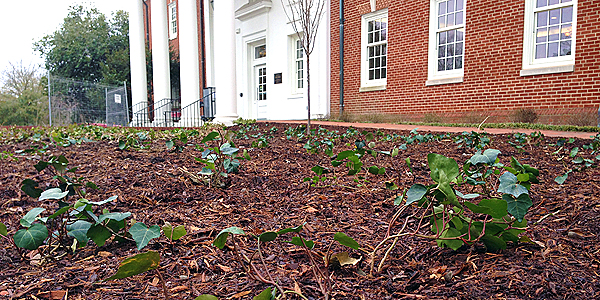NC State Hits Pay Dirt With New Mulch

Nothing says spring is near like a fresh layer of mulch on campus, and this year that mulch is more sustainable and cost-effective than ever.
A pilot project between NC State Grounds Management and the Horticulture Field Labs has resulted in the development of a new type of mulch blended from campus landscape debris and wood chips donated by a local tree company.
“This collaboration benefits both parties in that Grounds Management is able to get rid of landscape debris and the Horticulture Field Labs are able to refine the debris into a product that we can buy back at a reduced cost while also eliminating the cost of delivery, hauling and dumping,” said Jeff Del Pinal, NC State’s senior grounds manager.
This is the first year NC State has used the mulch blend, which is half the cost of the triple shredded hardwood mulch normally purchased from an outside vendor and applied to campus landscape areas for improved soil composition, increased moisture retention and weed reduction. Offering the same benefits as traditional mulch, up to 400 cubic yards of the mulch blend will be applied to 15 percent of campus, including areas near the Belltower such as Holladay Hall, Primrose Hall and Peele Hall.
Closed Loop System
In addition to cost savings, the mulch blend reduces greenhouse gas emissions associated with long-distance delivery, has no chemical additives and initiates “a closed loop system in which we keep organic material on campus for continued use,” said Sarah Ketchem, director of Grounds and Fleet Services.
The mulch blend has been used successfully for several months at NC State’s J.C. Raulston Arboretum, which had previously used leaf mulch that degraded quickly and had to be reapplied often.
“Using leaves alone [as mulch] breaks down too fast, so adding wood chips extends the life of the mulch. It’s a more viable product,” said Bradley Holland, superintendent of Horticulture Field Labs and the developer of the mulch blend.
While most of campus will continue using traditional triple shredded hardwood mulch this year, Grounds Management and Horticulture Field Labs are working to expand the pilot program. Wood chips produced in future campus projects will be transported to Horticulture Field Labs, where Holland hopes next year to produce enough blended mulch to supply most of campus.
“This is an excellent opportunity for campus collaboration as well as raising awareness of more sustainable practices being implemented in the area of horticulture, landscaping and grounds maintenance,” Del Pinal said. “This program will provide a forward-thinking example of our awareness and responsibility toward minimizing environmental impacts.”


